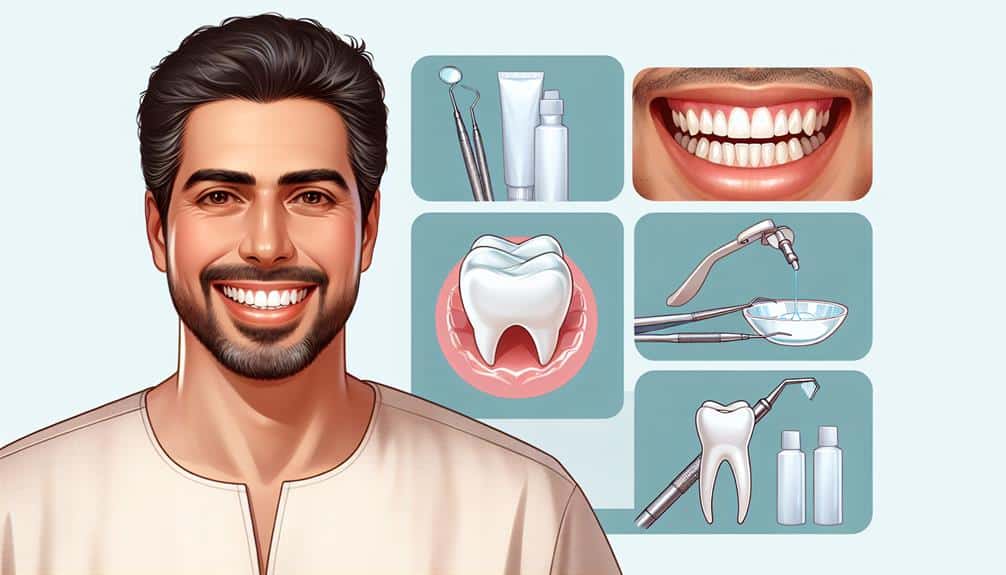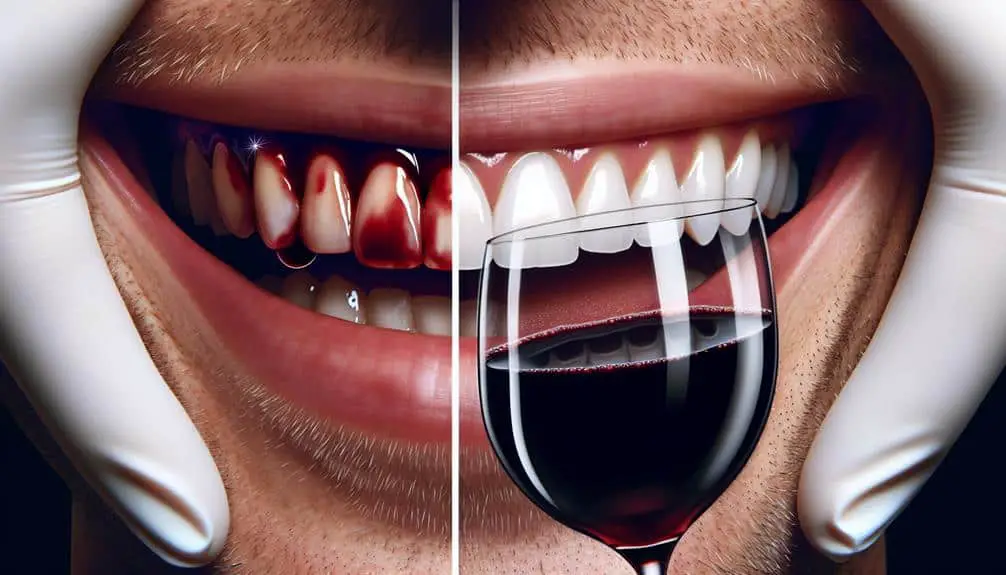To tackle tea-stained teeth, try gentle circular brushing with whitening toothpaste. Assure to cover all tooth surfaces effectively. Rinse with water after tea to dislodge stains without harming enamel. Opt for fluoride toothpaste with sensitivity and enamel protection. Consider herbal mouthwashes or DIY remedies like baking soda for natural whitening. Limit tea intake, choose herbal or green teas, and visit your dentist for cleanings. Professional whitening treatments like laser or bleaching trays offer effective solutions. Implement these strategies for a brighter smile. Additional tips await to enhance your oral care routine and combat stubborn tea stains.
Key Points
- Use gentle brushing techniques to remove tea stains without enamel damage.
- Choose whitening toothpaste with fluoride and enamel-strengthening properties.
- Rinse with natural remedies like herbal mouthwashes and DIY treatments.
- Limit tea consumption, opt for herbal or green teas, and visit the dentist regularly.
- Consider professional whitening treatments like laser or bleaching trays for lasting results.
Brushing Techniques for Tea Stains
To effectively remove tea stains from your teeth, adjust your brushing technique by using a gentle circular motion with a whitening toothpaste. Important technique is essential in combating tea stains and preventing their recurrence. When brushing, make sure that you're reaching all surfaces of your teeth, including the hard-to-reach areas. Gentle circular motions help to dislodge the stains without being too harsh on your enamel.
Prevention strategies play a vital role in managing tea-stained teeth. One effective method is to rinse your mouth with water after consuming tea to minimize the contact time between the tea and your teeth. Additionally, using a straw when drinking tea can help reduce direct contact with your teeth, hence lowering the chances of staining. Regular dental check-ups can also aid in early detection of tea stains, allowing for prompt intervention.
Choosing the Right Whitening Toothpaste
Selecting the appropriate whitening toothpaste is crucial in effectively combating tea stains on your teeth. When choosing a whitening toothpaste, opt for one that contains fluoride for its advantages in strengthening enamel and preventing cavities. Fluoride aids in remineralizing enamel, which can be particularly beneficial when fighting stains caused by tea consumption. Additionally, look for a toothpaste that offers sensitivity prevention, especially if you experience sensitivity to hot or cold foods. A gentle formula can help prevent further enamel erosion while still effectively removing surface stains.
To make sure you're selecting the right whitening toothpaste for your needs, read the product labels carefully and look for those that are specifically formulated for whitening and stain removal. While whitening toothpaste can help lift stains, it's important to use them as part of a thorough oral care routine that includes regular brushing, flossing, and dental check-ups. By incorporating a quality whitening toothpaste that offers fluoride benefits, enamel protection, sensitivity prevention, and a gentle formula, you can effectively combat tea stains and maintain a healthy, bright smile.
Rinsing With Natural Remedies
When combating tea stains on your teeth, consider rinsing with natural remedies to help maintain a brighter smile. Herbal mouthwashes can be an effective way to reduce tea stains on your teeth. Ingredients like mint, neem, and clove have natural antibacterial properties that can help fight plaque and prevent staining. These mouthwashes can also freshen your breath while promoting overall oral health.
In addition to herbal mouthwashes, DIY whitening treatments can be a cost-effective solution for tea-stained teeth. Baking soda, for example, is a common ingredient in homemade whitening pastes. Its mild abrasiveness can help scrub away surface stains caused by tea consumption. Another DIY option is oil pulling with coconut or sesame oil, which involves swishing oil around in your mouth to remove bacteria and whiten teeth naturally.
Limiting Tea Consumption
Consider prioritizing your tea intake to help prevent further staining on your teeth and maintain a brighter smile. While tea offers numerous health benefits, its high tannin content can lead to discoloration over time.
If you enjoy tea, try incorporating alternatives such as herbal teas, white teas, or green teas, which have lower tannin levels and are less likely to stain your teeth. These options still provide the comforting warmth and flavor you love without as much risk of discoloration.
In addition to exploring tea alternatives, it's crucial to emphasize regular dental visits. Your dentist can assess the extent of staining on your teeth and provide professional cleanings to remove surface stains effectively. Professional cleanings help prevent tea stains from becoming deeply embedded in your enamel, making it easier to maintain a whiter smile over time.
Professional Whitening Treatments
For effective removal of stubborn tea stains, professional whitening treatments offer a dependable solution. When over-the-counter products fail to produce the desired results, turning to professional options can be a game-changer. Cosmetic dentistry provides various professional whitening treatments like whitening strips, bleaching trays, and laser treatments that can effectively eliminate tough tea stains.
Dentists often recommend in-office laser treatments for quick and noticeable results. Laser treatment targets deep-set stains, breaking them down to reveal a brighter smile. Additionally, bleaching trays customized by dental professionals allow for a more controlled whitening process, ensuring even coverage and minimizing sensitivity.
While whitening strips can be used at home, professional whitening treatments administered by dental experts are often more potent and provide superior results. The expertise of a professional guarantees that the treatment is tailored to your specific needs, delivering a more effective and long-lasting outcome compared to over-the-counter alternatives. If tea stains are persistent, investing in professional whitening treatments may be the key to achieving a whiter, brighter smile.
Frequently Asked Questions
Can Using a Straw Help Prevent Tea Stains on Teeth?
Drinking habits play a key role in dental hygiene. Using a straw can help prevent tea stains on teeth by reducing direct contact with enamel-staining liquids. It's a simple yet effective way to maintain a brighter smile.
Are There Any Specific Types of Tea That Are More Likely to Cause Staining Than Others?
Different tea varieties can vary in their staining potential. Black teas are more likely to cause stains due to higher tannin content. Brushing and flossing after consuming tea can help prevent staining on your teeth.
How Long Does It Typically Take for Tea Stains to Develop on Teeth?
Tea consumption and oral hygiene practices impact how long it takes for tea stains to form on your teeth. The more frequently you drink tea and neglect proper dental care, the quicker those stains can develop.
Can Using a Tongue Scraper Help Remove Tea Stains From the Tongue?
Using a tongue scraper is an effective way to improve tongue hygiene. It can help remove bacteria and debris, leading to better oral health. Regular use of a tongue scraper has been shown to reduce bad breath and improve overall dental hygiene.
Are There Any Specific Foods or Drinks That Can Help Prevent Tea Stains on Teeth?
To prevent tea stains on your teeth, consider tea alternatives like herbal infusions. Maintaining good oral hygiene, brushing and flossing regularly, and visiting your dentist can also help keep your teeth free from discoloration.



